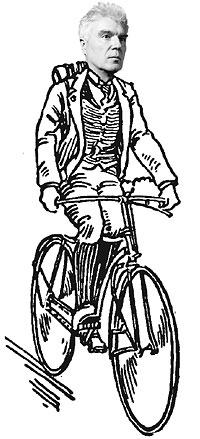|
Bike-Seat Philosopher
By Geoff Nicholson, The New York Times Book Review, 25 September 2009 [Link]
“David Byrne: singer, artist, composer, director, Talking Head.” I’m quoting the bartender Moe Szyslak from “The Simpsons” here, from an episode in which Byrne appeared. One could also add photographer, author, designer and, since the early 1980s, serious bicyclist. At first he just rode in downtown Manhattan, but as his career has taken him around the world he’s packed his full-size folding bike and carried it with him, sometimes resentfully paying a $125 “sports equipment” surcharge on airplanes.
 “Bicycle Diaries” contains accounts of his travels in distant cities like London, Berlin, Buenos Aires and Manila, as well as some closer to home — New Orleans, San Francisco and Detroit. His description of riding in Detroit is especially good: “I bike from the center of town out to the suburbs. It’s an amazing ride — a time line through a city’s history, its glory and betrayal.” “Bicycle Diaries” contains accounts of his travels in distant cities like London, Berlin, Buenos Aires and Manila, as well as some closer to home — New Orleans, San Francisco and Detroit. His description of riding in Detroit is especially good: “I bike from the center of town out to the suburbs. It’s an amazing ride — a time line through a city’s history, its glory and betrayal.”
For Byrne bicycling is partly a means, partly an end. It helps him get places, makes him feel more connected to life on the streets, and also serves as a “form of meditation” that keeps him sane. Inevitably the diary format gives the book a random, scattershot quality: Byrne is in no sense a “programmatic” bike rider, and he admits he’s sometimes just skimming over the surface of the cultures he encounters. Even so, his interests and activities — cutting-edge art exhibitions, rock festivals, a subversive PowerPoint presentation about PowerPoint presentations, a belly dance party — and certainly his personality are singular enough to give the book consistency and coherence. Byrne can be a very shrewd and droll observer. In Berlin he finds his ride disrupted because Colin Powell (“he of the Evil Empire”) is in town and many of the roads are closed off and guarded by riot police. In London he sees an upper-class matron in “full regalia — a green hunting jacket, beige trousers and Wellington boots. Is she planning on off-roading it?” No, she’s going for a walk in Hyde Park. In Manila he tells us about a television channel that plays nonstop karaoke. “You can stay at home and sing along with your television. Like some kind of radical conceptual art piece — but unlike conceptual art it’s super-popular.” You’ll have noticed that not all these observations are strictly bicycle-related.
The book, then, is partly about cycling but also about whatever Byrne happens to have on his mind at the time, and fortunately a lot of it is quite interesting. He writes (not surprisingly) very well about music, saying that “singers...when they write or perform a song don’t so much bring to the work already formed emotions, ideas and feelings as much as they use the act of singing as a device that reproduces and dredges them up.” This must come as news to “American Idol” contestants. I also very much enjoyed this sardonic observation: “The two biggest self-deceptions of all are that life has a ‘meaning’ and that each of us is unique.” At other times he overreaches, wrestling with huge philosophical and ethical problems — the nature of beauty, the time limit on justice — issues that have exercised the greatest minds in the world for millenniums, and rather unsurprisingly he doesn’t come up with anything new. But then who would expect him to? The book’s epilogue is a manifesto of sorts about the future sustainability of cities, and it’s fine as far as it goes, but I’m not sure that David Byrne’s quirky talents are best employed in such a thoroughly unironic enterprise. Finally, however, he does have a piece of advice for would-be cyclists who are older than he is (he’s in his mid-50s) or at least less willowy: “You don’t really need the spandex.” That’s so good to know.
Geoff Nicholson’s most recent book is “The Lost Art of Walking.”
|

